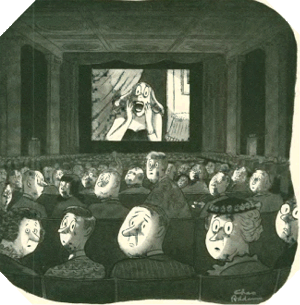When a drowsy, dreamy influence seems to hang over sessions of sweet silent thought, and to pervade every nook and cranny of a mind in repose, I marvel at the vividness of early childhood memories, and the immediacy of their intricately woven sensations ... a chaos of clear ideas that form the very essence of being and consciousness. The recall, for example, of summer languidness on the last day of a school year in an empty classroom, windows flung open to the enticing bright sunny freedom of a cooling breeze, mingled with the sharp anguished lonely dismay of sudden release from routine. These memories linger as vivid mood pictures imbedded in the mind, involving feelings which in manifold variety shape individual personalities. The subtle nuances and flavors of a whole culture and way of life long past, essentially permanent archetypes of human character and experience, can and do haunt the cavernous corridors of a vast unconsciousness curiously shaping en masse the character of a whole community.
 |
| uncanny musical genius |
Czech composer Dvorak (1841-1904) [pictured with his wife in 1886] captured with uncanny musical genius the sense of such a time past … wide open country settings languishing under vast cathedralic canopies of pale blue skies and billowy wisps of pure white clouds, coalescing with the rapturous intricacies of simple rural life. His music conveys a sense of this bucolic past with such delicate knowing intimacy that tears might easily well up in one's eyes … for there is profound sadness in this music, a compelling intuition that Dvorak was driven to capture a thing of wondrous beauty knowing full well it was fleeting:
"https://www.youtube.com/embed/PbNWuTC4n_8"
"https://www.youtube.com/embed/PbNWuTC4n_8"
This was a time of ancestors long gone and forgotten, their remnants buried in little country church cemeteries, slowly succumbing to nature’s inexorable disintegrating forces:



When my father died and I spoke at his funeral, I explained that I was "The Little Match Girl" in my memories of him. You strike a match, it illuminates for the time it takes to burn, and then you are again surrounded by the dark. Repeatedly striking them you have the scenes of your life with such a parent. Then the box is empty.
ReplyDeleteBecause I could not stop for Death –
ReplyDeleteHe kindly stopped for me –
The Carriage held but just Ourselves –
And Immortality.
We slowly drove – He knew no haste
And I had put away
My labor and my leisure too,
For His Civility –
We passed the School, where Children strove
At Recess – in the Ring –
We passed the Fields of Gazing Grain –
We passed the Setting Sun –
Or rather – He passed us –
The Dews drew quivering and chill –
For only Gossamer, my Gown –
My Tippet – only Tulle –
We paused before a House that seemed
A Swelling of the Ground –
The Roof was scarcely visible –
The Cornice – in the Ground –
Since then – 'tis Centuries – and yet
Feels shorter than the Day
I first surmised the Horses' Heads
Were toward Eternity –
I don’t think most people realize how consciously our nineteenth-century writers set about the task of creating or transcribing American myths. They had found what they called romance in Europe and wanted to transport it to the American scene, so that it too would “serve to make our country dearer and more interesting to us,” as Hawthorne said, “and afford fit soil for poetry to root itself in.” By 1890 they had actually created a unified tissue of nationality— but then the country began changing from agricultural to industrial, rural to urban, and the new generation required new myths. The battle between idealism and realism that raged from 1886 to 1910 and after (to be revived in the Humanist controversy) was also a battle between two mythologies. Now the country has changed again and we are looking for new myths to express a new time.
ReplyDelete